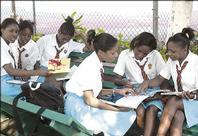Wendel Abel

As these students at Wolmer's Girls' School in Kingston demonstrate, study groups, once they are productive, are a good way to prepare for upcoming examinations. - CARLINGTON WILMOT/FREELANCE PHOTOGRAPHER
THIS IS the time of year when several students islandwide prepare for examinations. However, this is not a time to panic. Instead, if students follow certain tips, it is likely that they will not only do well in their exams, but they will remain physically and mentally healthy. There is no denying that students' mental state is critical to passing exams so as the tests creep closer, the following tips can help ease pre-exam tension:
1. Start studying now. Do not leave exam preparation for the last minute.
2. Create a schedule. This involves doing an overview of the work that must be done. In addition, it is wise for students to develop a detailed schedule that sets out all the things they have to do. This should include the time they will be spending on a particular topic or subject.
3. Students should list the areas which are to be covered according to priority. This should include the important topics and subjects. They must not waste time studying topics they already know very well. It is better to use the time to learn an important area with which they are not familiar.
4. Avoid the 'escape syndrome'. This occurs when students may think about the amount of work they have to cover and become anxious and start to postpone studying. Instead, they may opt to do activities such as watching television, talking on the phone or chatting with friends. If students realise that they are becoming anxious, they must relax, develop a study plan and start working.
5. Students must review the material they have to cover quickly. They should then decide on the key areas on which they want to focus. They can use a study guide or syllabus to guide them. While reviewing material, it is important for them to focus on key ideas. It is good to remember the captions in a chapter. At the end of studying the material, students can either recite the information to themselves or a friend or write short notes. This will also keep them awake.
6. Study groups are helpful, but students should join only groups made up of students who are well prepared. Avoid groups that waste time. It is advisable to always prepare topics given to them ahead of group meetings and to make sure they contribute to the group.
7. Study aids help, among them diagrams and flow charts. However, students should realise that they may have to review a particular area several times before they are able to understand and recall it.
8. Avoid using too many textbooks. This can be unproductive. This is especially true at the CXC basic level. At the advanced level and at the university level, students may have to do extensive reading at times.
9. It is important to review your syllabus and curriculum and ensure that you cover the critical areas and all other areas. This allows students to have a clear idea of what they are expected to learn and what they could possibly be examined on. It may be good for general knowledge to learn information that is outside the curriculum, but it does not make much sense to study information on which they will not be examined. Keep focused. Reviewing papers from past examinations does help.
10. It is important that students get adequate sleep and a well-balanced diet. Most persons need six to eight hours of sleep. Students should note that a tired brain cannot function well and that it is difficult to concentrate or study when they are hungry. It is also difficult to study after a heavy meal because an increase in blood sugar will make them drowsy.
11. It is important to find a comfortable area in which to study. The area must be free of distractions, so avoid studying in a bedroom or in bed. This will make students more likely to fall asleep.
12. Subjects, such as mathematics, physics and chemistry have problems that cannot be studied by heart, so practical application is needed. If they study foreign languages, students must learn and practise areas such as vocabulary.
Students of literature are required to review books, while in subjects such as history, lecture notes must be reviewed.
In addition to physical preparation, there is also the mental aspect of remaining stress free and confident. So, ahead of the exam, adopt a fighting mental attitude. Students must tell themselves that they will pass their exams and must reinforce this with positive affirmations.
Dr. Wendel Abel is a
consultant psychiatrist and senior lecturer, University of the West Indies; email: yourhealthgleanerjm.com.



